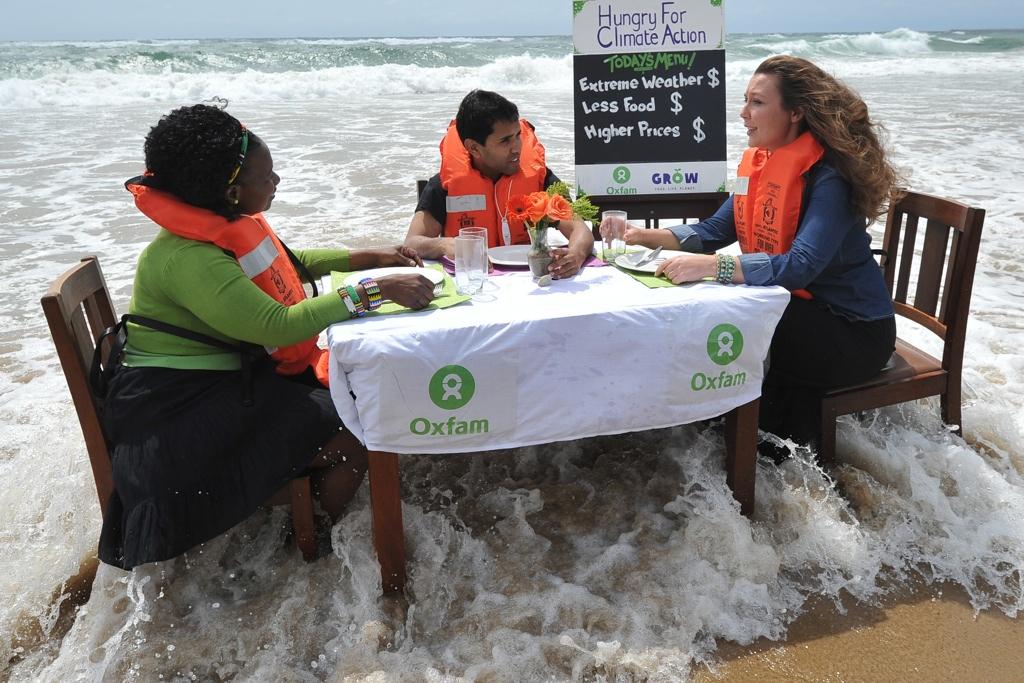Climate change talks face challenges
Climate change activists protest in Durban, South Africa before the opening of the 17th Conference of the Parties (COP17) under the UN Framework Convention on Climate Change (UNFCCC) on November 27, 2011. Inspired by the Occupy Wall St. movement, protesters calling for “climate justice” urged leaders to reach agreement on environmental issues.
JOHANNESBURG, South Africa — The United Nations climate summit opened in Durban with a quotation from Nelson Mandela intending to inspire the delegates, but also underscoring the improbability of progress in the two weeks of negotiations ahead.
"It always seems impossible until it is done," said UN climate chief Christiana Figueres, quoting Mandela’s words about the difficulty of defeating apartheid.
For the delegates from 194 nations in Durban for the climate change talks — officially known as COP 17 — the outcome looks stormy.
COP 17 coincides with a global economic crisis that is likely to dent crucial funding from developed countries to help poor nations that are badly affected by climate change, and yet least responsible for it.
More from GlobalPost: Climate changes rice in Japan
The Durban talks are also saddled by the continuing refusal of key industrialized countries to commit to slashing greenhouse gas emissions, a necessary step to keep the rate of global warming below 2 degrees Celsius, an internationally agreed upon target.
The beleaguered Kyoto Protocol, the only global agreement with targets for cutting emissions, expires next year unless renewed.
"We are in Durban with one purpose: to find a common solution that will secure a future to generations to come," said Maite Nkoana-Mashabane, South Africa’s international relations minister who is chairing the summit.
Bernarditas Muller, chief negotiator for the G77 countries, warned at a recent briefing in Johannesburg that the event will be a political battleground.
There are concerns that Durban could be the place where the Kyoto Protocol goes to die — or “be put on a respirator, just so it will not die here, so it will die somewhere else,” mused Muller.
Video from GlobalPost: Fighting climate change one town at a time
Even the host country South Africa has tempered its expectations for the next two weeks.
"We go to Durban with no illusion at all that it will be a walk in the park," South African President Jacob Zuma had admitted in a recent speech.
But at the opening of the conference on Monday, Zuma stressed the importance of seeking a deal. "For most people in the developing countries and Africa, climate change is a matter of life and death,” he said.
A UN panel warned this month that some of the extreme weather currently experienced around the world, including the drought in the Horn of Africa and record flooding in Bangkok, is a result of human-induced climate change from carbons emissions.
More from GlobalPost: The global cost of climate change
These weather extremes can be expected to worsen in the coming decades, with more record-high temperatures, flooding and storms.
In Africa, where many people survive on rain-dependent agriculture, changes to the climate affect the lives of millions.
“Africa has contributed least to the buildup of greenhouse gases globally, but will be in the frontline of the adverse effects of climate change,” said Edna Molewa, South Africa’s minister of environmental affairs at the start of the summit.
Figueres, in her opening speech, highlighted the importance of industrialized countries committing to cut greenhouse gas emissions, pointing to the devastating effects of climate change in developing countries.
"Many Africans unfortunately already have firsthand experience of the suffering that climate change can cause,” she said, adding: "Finding a workable way forward is the defining issue of this conference.”
Every day, reporters and producers at The World are hard at work bringing you human-centered news from across the globe. But we can’t do it without you. We need your support to ensure we can continue this work for another year.
Make a gift today, and you’ll help us unlock a matching gift of $67,000!
